Experiences of Cancer Patients During Treatment: A Nursing Report
VerifiedAdded on 2023/04/19
|14
|3808
|77
Report
AI Summary
This nursing assignment report delves into the multifaceted experiences of cancer patients during their treatment journeys. It synthesizes findings from a literature search across databases like CINAHL, MEDLINE, and Ovid MEDLINE ALL, focusing on articles published between January 2017 and February 2019. The report addresses the physical and emotional impacts of cancer, including symptoms like nausea, fatigue, and pain, and their effects on patients' quality of life. Key themes explored include the experiences of patients within the LGBT community, the impact of adjuvant endocrine therapy, patient experiences with cancer screening, and the psychosocial and physical illness trajectories of cancer patients. The report highlights the importance of patient-centered care, the challenges of cognitive impairment, and the need for improved emotional support and information provision throughout the treatment process. The findings underscore the significance of understanding patient perspectives to enhance healthcare quality and address the diverse needs of individuals undergoing cancer treatment.
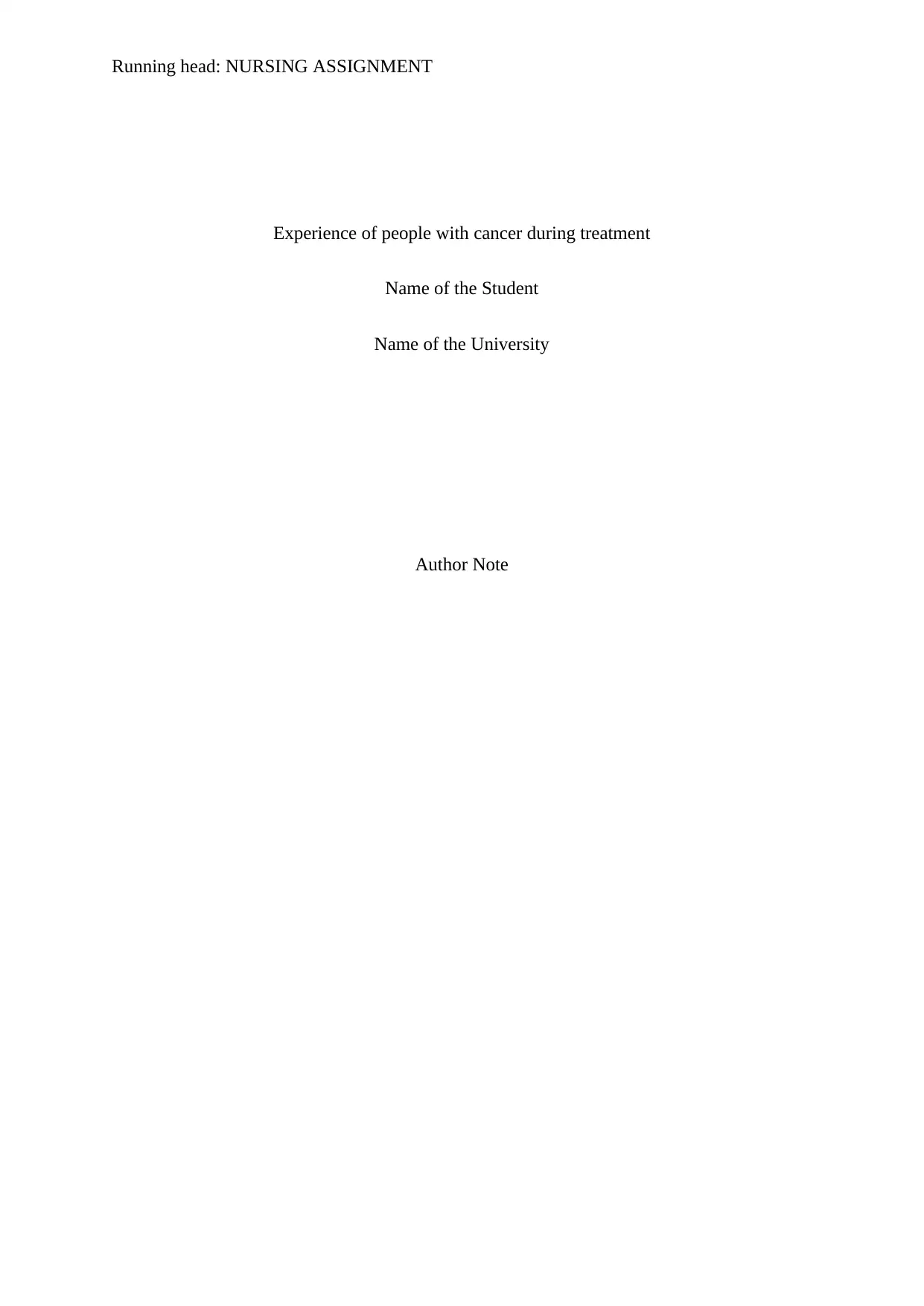
Running head: NURSING ASSIGNMENT
Experience of people with cancer during treatment
Name of the Student
Name of the University
Author Note
Experience of people with cancer during treatment
Name of the Student
Name of the University
Author Note
Paraphrase This Document
Need a fresh take? Get an instant paraphrase of this document with our AI Paraphraser
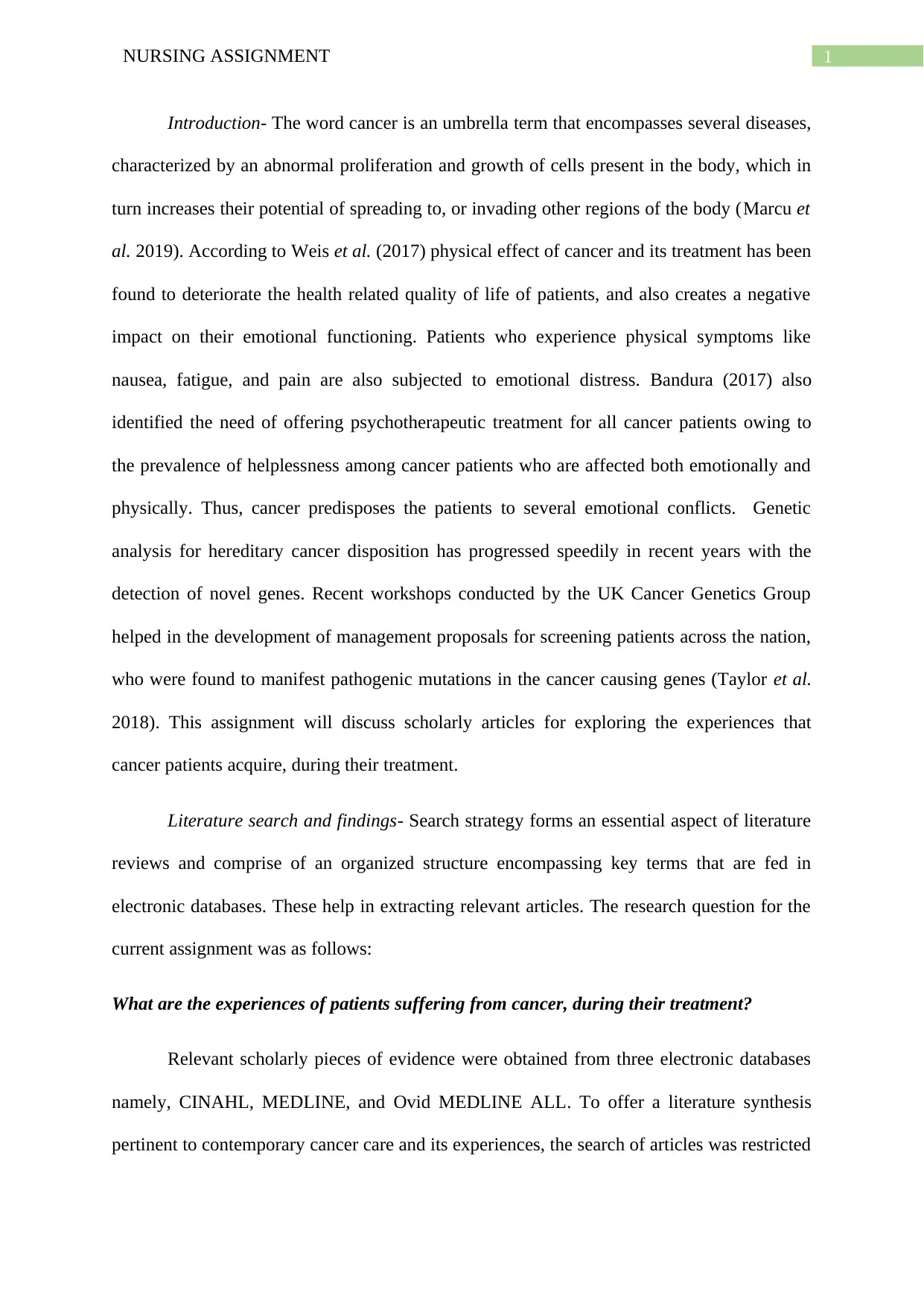
1NURSING ASSIGNMENT
Introduction- The word cancer is an umbrella term that encompasses several diseases,
characterized by an abnormal proliferation and growth of cells present in the body, which in
turn increases their potential of spreading to, or invading other regions of the body (Marcu et
al. 2019). According to Weis et al. (2017) physical effect of cancer and its treatment has been
found to deteriorate the health related quality of life of patients, and also creates a negative
impact on their emotional functioning. Patients who experience physical symptoms like
nausea, fatigue, and pain are also subjected to emotional distress. Bandura (2017) also
identified the need of offering psychotherapeutic treatment for all cancer patients owing to
the prevalence of helplessness among cancer patients who are affected both emotionally and
physically. Thus, cancer predisposes the patients to several emotional conflicts. Genetic
analysis for hereditary cancer disposition has progressed speedily in recent years with the
detection of novel genes. Recent workshops conducted by the UK Cancer Genetics Group
helped in the development of management proposals for screening patients across the nation,
who were found to manifest pathogenic mutations in the cancer causing genes (Taylor et al.
2018). This assignment will discuss scholarly articles for exploring the experiences that
cancer patients acquire, during their treatment.
Literature search and findings- Search strategy forms an essential aspect of literature
reviews and comprise of an organized structure encompassing key terms that are fed in
electronic databases. These help in extracting relevant articles. The research question for the
current assignment was as follows:
What are the experiences of patients suffering from cancer, during their treatment?
Relevant scholarly pieces of evidence were obtained from three electronic databases
namely, CINAHL, MEDLINE, and Ovid MEDLINE ALL. To offer a literature synthesis
pertinent to contemporary cancer care and its experiences, the search of articles was restricted
Introduction- The word cancer is an umbrella term that encompasses several diseases,
characterized by an abnormal proliferation and growth of cells present in the body, which in
turn increases their potential of spreading to, or invading other regions of the body (Marcu et
al. 2019). According to Weis et al. (2017) physical effect of cancer and its treatment has been
found to deteriorate the health related quality of life of patients, and also creates a negative
impact on their emotional functioning. Patients who experience physical symptoms like
nausea, fatigue, and pain are also subjected to emotional distress. Bandura (2017) also
identified the need of offering psychotherapeutic treatment for all cancer patients owing to
the prevalence of helplessness among cancer patients who are affected both emotionally and
physically. Thus, cancer predisposes the patients to several emotional conflicts. Genetic
analysis for hereditary cancer disposition has progressed speedily in recent years with the
detection of novel genes. Recent workshops conducted by the UK Cancer Genetics Group
helped in the development of management proposals for screening patients across the nation,
who were found to manifest pathogenic mutations in the cancer causing genes (Taylor et al.
2018). This assignment will discuss scholarly articles for exploring the experiences that
cancer patients acquire, during their treatment.
Literature search and findings- Search strategy forms an essential aspect of literature
reviews and comprise of an organized structure encompassing key terms that are fed in
electronic databases. These help in extracting relevant articles. The research question for the
current assignment was as follows:
What are the experiences of patients suffering from cancer, during their treatment?
Relevant scholarly pieces of evidence were obtained from three electronic databases
namely, CINAHL, MEDLINE, and Ovid MEDLINE ALL. To offer a literature synthesis
pertinent to contemporary cancer care and its experiences, the search of articles was restricted
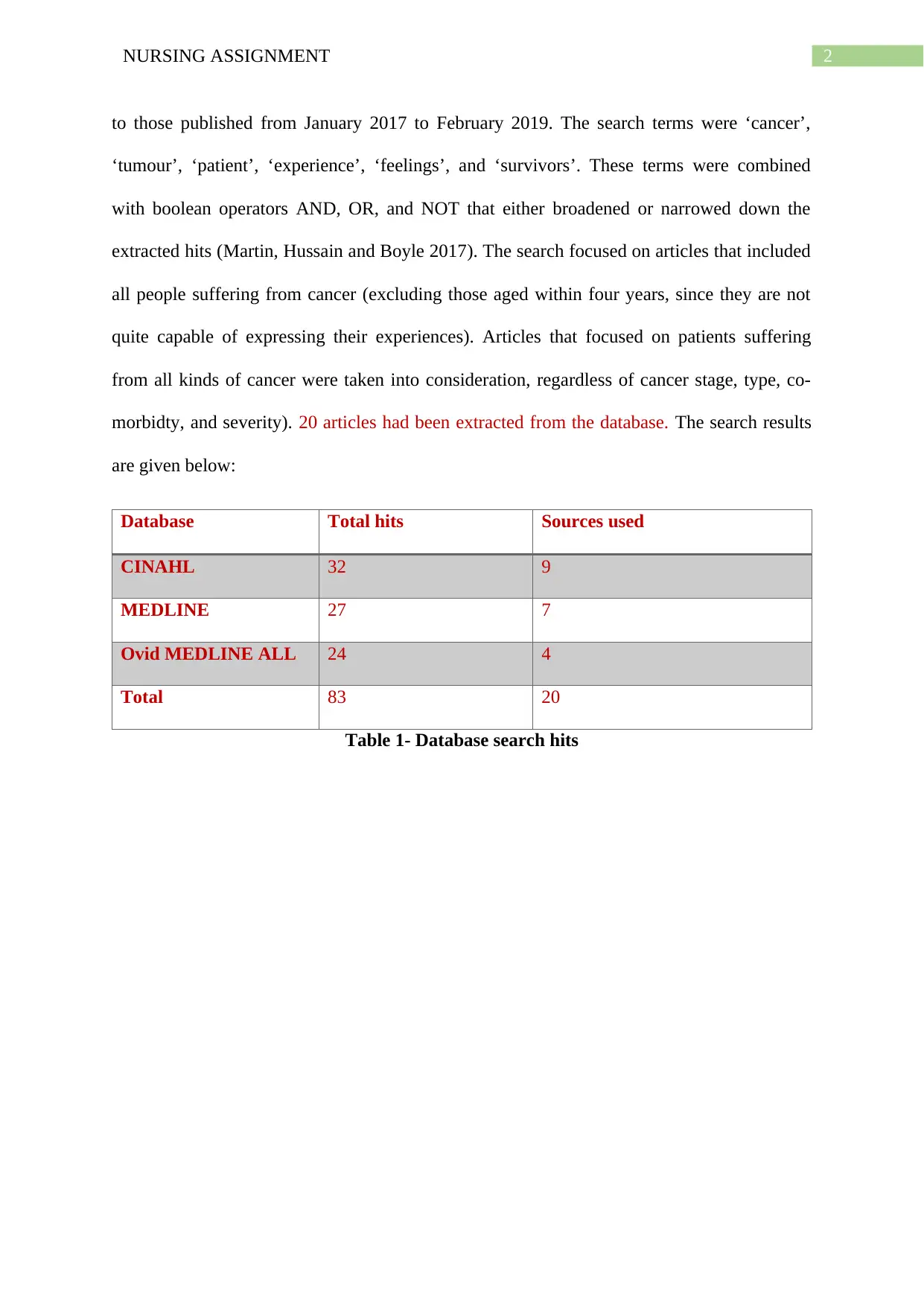
2NURSING ASSIGNMENT
to those published from January 2017 to February 2019. The search terms were ‘cancer’,
‘tumour’, ‘patient’, ‘experience’, ‘feelings’, and ‘survivors’. These terms were combined
with boolean operators AND, OR, and NOT that either broadened or narrowed down the
extracted hits (Martin, Hussain and Boyle 2017). The search focused on articles that included
all people suffering from cancer (excluding those aged within four years, since they are not
quite capable of expressing their experiences). Articles that focused on patients suffering
from all kinds of cancer were taken into consideration, regardless of cancer stage, type, co-
morbidty, and severity). 20 articles had been extracted from the database. The search results
are given below:
Database Total hits Sources used
CINAHL 32 9
MEDLINE 27 7
Ovid MEDLINE ALL 24 4
Total 83 20
Table 1- Database search hits
to those published from January 2017 to February 2019. The search terms were ‘cancer’,
‘tumour’, ‘patient’, ‘experience’, ‘feelings’, and ‘survivors’. These terms were combined
with boolean operators AND, OR, and NOT that either broadened or narrowed down the
extracted hits (Martin, Hussain and Boyle 2017). The search focused on articles that included
all people suffering from cancer (excluding those aged within four years, since they are not
quite capable of expressing their experiences). Articles that focused on patients suffering
from all kinds of cancer were taken into consideration, regardless of cancer stage, type, co-
morbidty, and severity). 20 articles had been extracted from the database. The search results
are given below:
Database Total hits Sources used
CINAHL 32 9
MEDLINE 27 7
Ovid MEDLINE ALL 24 4
Total 83 20
Table 1- Database search hits
⊘ This is a preview!⊘
Do you want full access?
Subscribe today to unlock all pages.

Trusted by 1+ million students worldwide
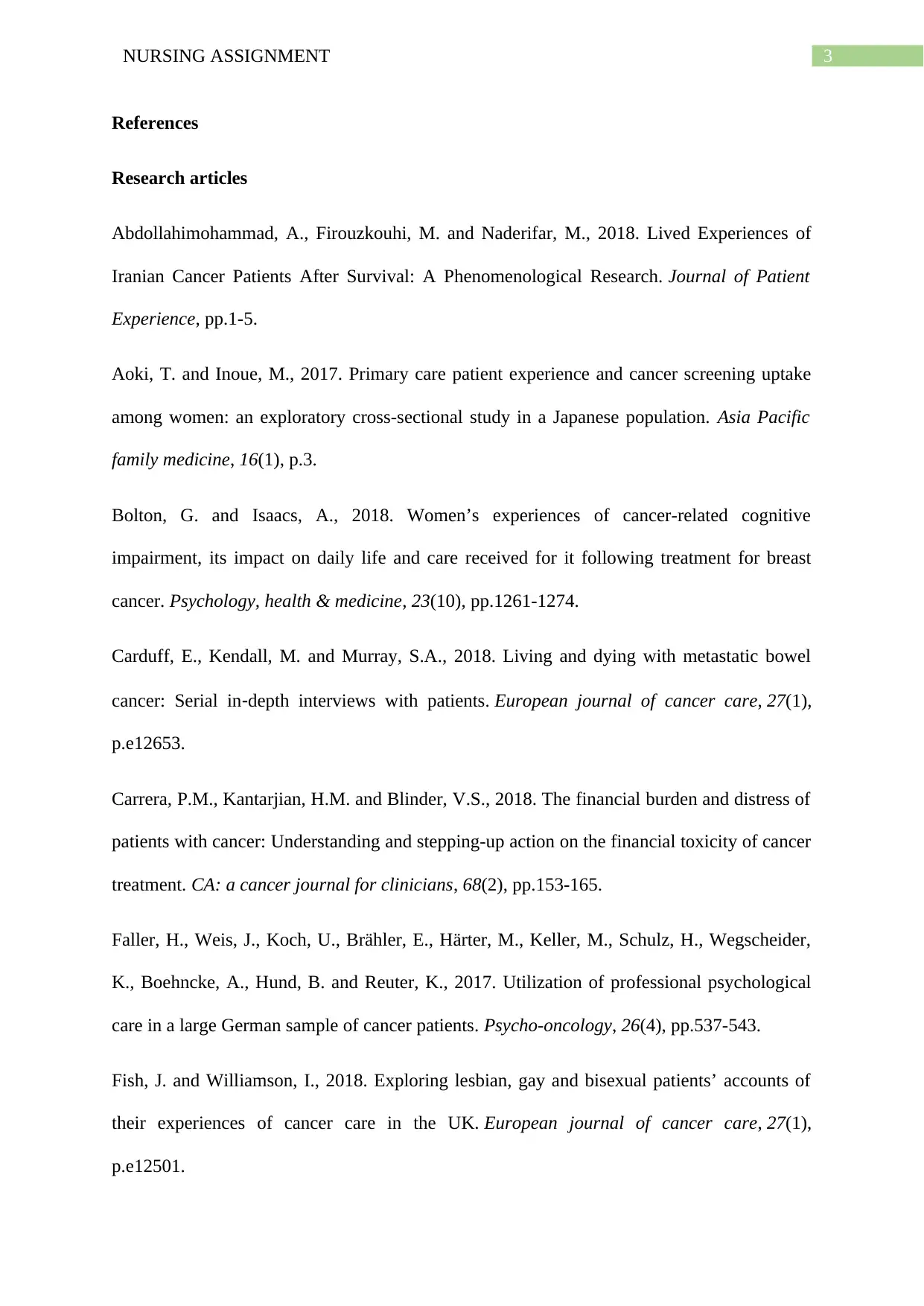
3NURSING ASSIGNMENT
References
Research articles
Abdollahimohammad, A., Firouzkouhi, M. and Naderifar, M., 2018. Lived Experiences of
Iranian Cancer Patients After Survival: A Phenomenological Research. Journal of Patient
Experience, pp.1-5.
Aoki, T. and Inoue, M., 2017. Primary care patient experience and cancer screening uptake
among women: an exploratory cross-sectional study in a Japanese population. Asia Pacific
family medicine, 16(1), p.3.
Bolton, G. and Isaacs, A., 2018. Women’s experiences of cancer-related cognitive
impairment, its impact on daily life and care received for it following treatment for breast
cancer. Psychology, health & medicine, 23(10), pp.1261-1274.
Carduff, E., Kendall, M. and Murray, S.A., 2018. Living and dying with metastatic bowel
cancer: Serial in‐depth interviews with patients. European journal of cancer care, 27(1),
p.e12653.
Carrera, P.M., Kantarjian, H.M. and Blinder, V.S., 2018. The financial burden and distress of
patients with cancer: Understanding and stepping‐up action on the financial toxicity of cancer
treatment. CA: a cancer journal for clinicians, 68(2), pp.153-165.
Faller, H., Weis, J., Koch, U., Brähler, E., Härter, M., Keller, M., Schulz, H., Wegscheider,
K., Boehncke, A., Hund, B. and Reuter, K., 2017. Utilization of professional psychological
care in a large German sample of cancer patients. Psycho‐oncology, 26(4), pp.537-543.
Fish, J. and Williamson, I., 2018. Exploring lesbian, gay and bisexual patients’ accounts of
their experiences of cancer care in the UK. European journal of cancer care, 27(1),
p.e12501.
References
Research articles
Abdollahimohammad, A., Firouzkouhi, M. and Naderifar, M., 2018. Lived Experiences of
Iranian Cancer Patients After Survival: A Phenomenological Research. Journal of Patient
Experience, pp.1-5.
Aoki, T. and Inoue, M., 2017. Primary care patient experience and cancer screening uptake
among women: an exploratory cross-sectional study in a Japanese population. Asia Pacific
family medicine, 16(1), p.3.
Bolton, G. and Isaacs, A., 2018. Women’s experiences of cancer-related cognitive
impairment, its impact on daily life and care received for it following treatment for breast
cancer. Psychology, health & medicine, 23(10), pp.1261-1274.
Carduff, E., Kendall, M. and Murray, S.A., 2018. Living and dying with metastatic bowel
cancer: Serial in‐depth interviews with patients. European journal of cancer care, 27(1),
p.e12653.
Carrera, P.M., Kantarjian, H.M. and Blinder, V.S., 2018. The financial burden and distress of
patients with cancer: Understanding and stepping‐up action on the financial toxicity of cancer
treatment. CA: a cancer journal for clinicians, 68(2), pp.153-165.
Faller, H., Weis, J., Koch, U., Brähler, E., Härter, M., Keller, M., Schulz, H., Wegscheider,
K., Boehncke, A., Hund, B. and Reuter, K., 2017. Utilization of professional psychological
care in a large German sample of cancer patients. Psycho‐oncology, 26(4), pp.537-543.
Fish, J. and Williamson, I., 2018. Exploring lesbian, gay and bisexual patients’ accounts of
their experiences of cancer care in the UK. European journal of cancer care, 27(1),
p.e12501.
Paraphrase This Document
Need a fresh take? Get an instant paraphrase of this document with our AI Paraphraser
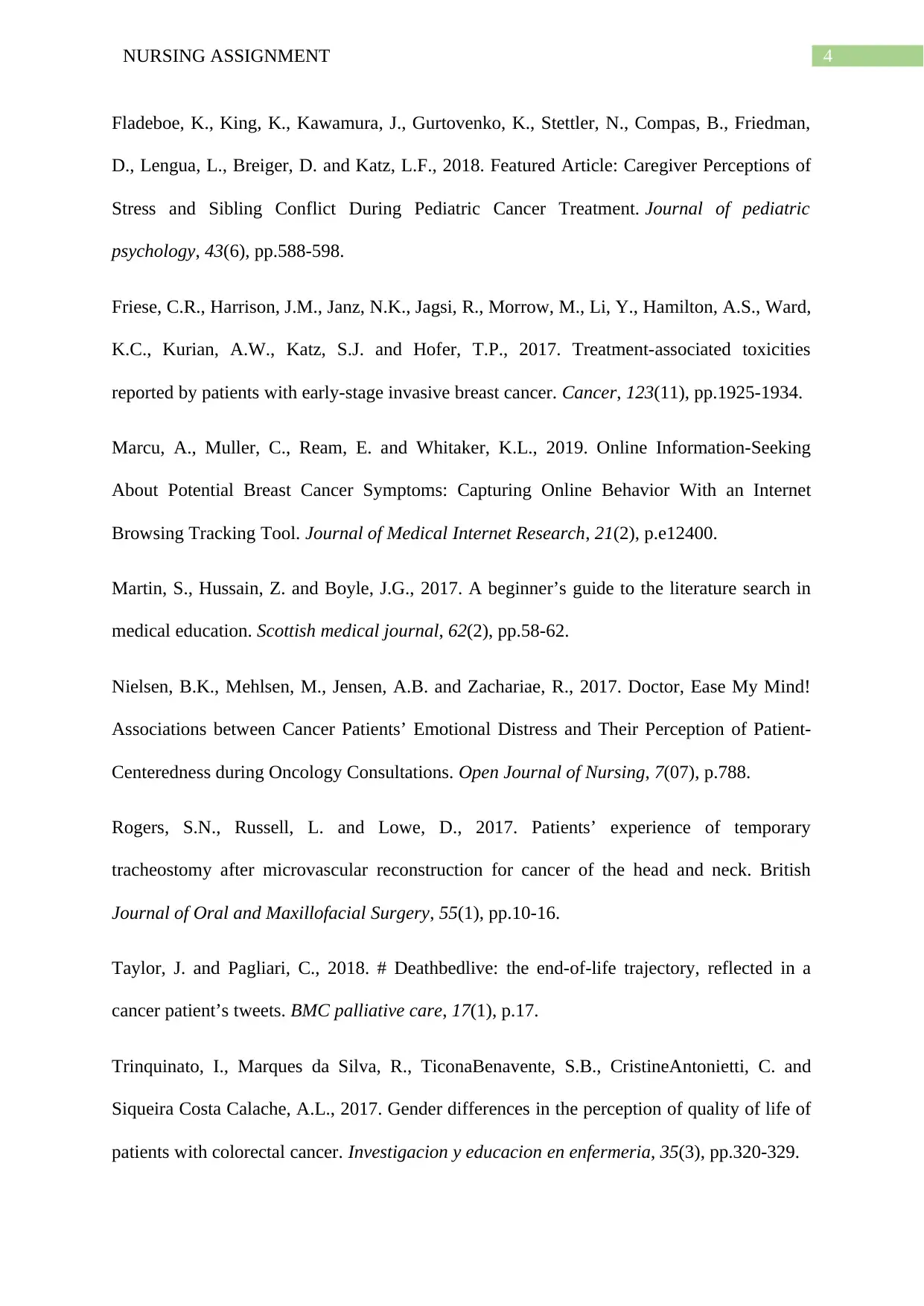
4NURSING ASSIGNMENT
Fladeboe, K., King, K., Kawamura, J., Gurtovenko, K., Stettler, N., Compas, B., Friedman,
D., Lengua, L., Breiger, D. and Katz, L.F., 2018. Featured Article: Caregiver Perceptions of
Stress and Sibling Conflict During Pediatric Cancer Treatment. Journal of pediatric
psychology, 43(6), pp.588-598.
Friese, C.R., Harrison, J.M., Janz, N.K., Jagsi, R., Morrow, M., Li, Y., Hamilton, A.S., Ward,
K.C., Kurian, A.W., Katz, S.J. and Hofer, T.P., 2017. Treatment-associated toxicities
reported by patients with early-stage invasive breast cancer. Cancer, 123(11), pp.1925-1934.
Marcu, A., Muller, C., Ream, E. and Whitaker, K.L., 2019. Online Information-Seeking
About Potential Breast Cancer Symptoms: Capturing Online Behavior With an Internet
Browsing Tracking Tool. Journal of Medical Internet Research, 21(2), p.e12400.
Martin, S., Hussain, Z. and Boyle, J.G., 2017. A beginner’s guide to the literature search in
medical education. Scottish medical journal, 62(2), pp.58-62.
Nielsen, B.K., Mehlsen, M., Jensen, A.B. and Zachariae, R., 2017. Doctor, Ease My Mind!
Associations between Cancer Patients’ Emotional Distress and Their Perception of Patient-
Centeredness during Oncology Consultations. Open Journal of Nursing, 7(07), p.788.
Rogers, S.N., Russell, L. and Lowe, D., 2017. Patients’ experience of temporary
tracheostomy after microvascular reconstruction for cancer of the head and neck. British
Journal of Oral and Maxillofacial Surgery, 55(1), pp.10-16.
Taylor, J. and Pagliari, C., 2018. # Deathbedlive: the end-of-life trajectory, reflected in a
cancer patient’s tweets. BMC palliative care, 17(1), p.17.
Trinquinato, I., Marques da Silva, R., TiconaBenavente, S.B., CristineAntonietti, C. and
Siqueira Costa Calache, A.L., 2017. Gender differences in the perception of quality of life of
patients with colorectal cancer. Investigacion y educacion en enfermeria, 35(3), pp.320-329.
Fladeboe, K., King, K., Kawamura, J., Gurtovenko, K., Stettler, N., Compas, B., Friedman,
D., Lengua, L., Breiger, D. and Katz, L.F., 2018. Featured Article: Caregiver Perceptions of
Stress and Sibling Conflict During Pediatric Cancer Treatment. Journal of pediatric
psychology, 43(6), pp.588-598.
Friese, C.R., Harrison, J.M., Janz, N.K., Jagsi, R., Morrow, M., Li, Y., Hamilton, A.S., Ward,
K.C., Kurian, A.W., Katz, S.J. and Hofer, T.P., 2017. Treatment-associated toxicities
reported by patients with early-stage invasive breast cancer. Cancer, 123(11), pp.1925-1934.
Marcu, A., Muller, C., Ream, E. and Whitaker, K.L., 2019. Online Information-Seeking
About Potential Breast Cancer Symptoms: Capturing Online Behavior With an Internet
Browsing Tracking Tool. Journal of Medical Internet Research, 21(2), p.e12400.
Martin, S., Hussain, Z. and Boyle, J.G., 2017. A beginner’s guide to the literature search in
medical education. Scottish medical journal, 62(2), pp.58-62.
Nielsen, B.K., Mehlsen, M., Jensen, A.B. and Zachariae, R., 2017. Doctor, Ease My Mind!
Associations between Cancer Patients’ Emotional Distress and Their Perception of Patient-
Centeredness during Oncology Consultations. Open Journal of Nursing, 7(07), p.788.
Rogers, S.N., Russell, L. and Lowe, D., 2017. Patients’ experience of temporary
tracheostomy after microvascular reconstruction for cancer of the head and neck. British
Journal of Oral and Maxillofacial Surgery, 55(1), pp.10-16.
Taylor, J. and Pagliari, C., 2018. # Deathbedlive: the end-of-life trajectory, reflected in a
cancer patient’s tweets. BMC palliative care, 17(1), p.17.
Trinquinato, I., Marques da Silva, R., TiconaBenavente, S.B., CristineAntonietti, C. and
Siqueira Costa Calache, A.L., 2017. Gender differences in the perception of quality of life of
patients with colorectal cancer. Investigacion y educacion en enfermeria, 35(3), pp.320-329.
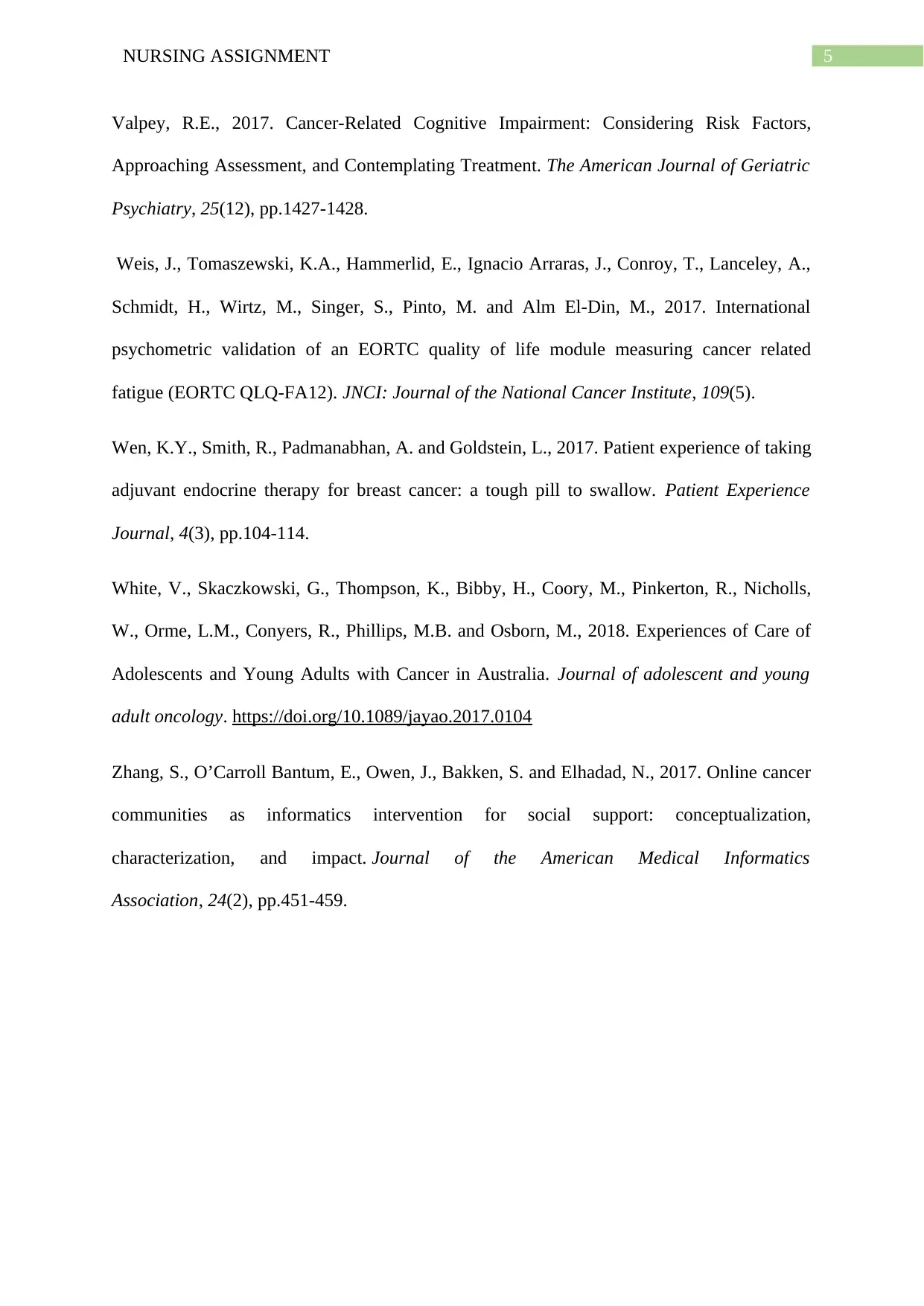
5NURSING ASSIGNMENT
Valpey, R.E., 2017. Cancer-Related Cognitive Impairment: Considering Risk Factors,
Approaching Assessment, and Contemplating Treatment. The American Journal of Geriatric
Psychiatry, 25(12), pp.1427-1428.
Weis, J., Tomaszewski, K.A., Hammerlid, E., Ignacio Arraras, J., Conroy, T., Lanceley, A.,
Schmidt, H., Wirtz, M., Singer, S., Pinto, M. and Alm El-Din, M., 2017. International
psychometric validation of an EORTC quality of life module measuring cancer related
fatigue (EORTC QLQ-FA12). JNCI: Journal of the National Cancer Institute, 109(5).
Wen, K.Y., Smith, R., Padmanabhan, A. and Goldstein, L., 2017. Patient experience of taking
adjuvant endocrine therapy for breast cancer: a tough pill to swallow. Patient Experience
Journal, 4(3), pp.104-114.
White, V., Skaczkowski, G., Thompson, K., Bibby, H., Coory, M., Pinkerton, R., Nicholls,
W., Orme, L.M., Conyers, R., Phillips, M.B. and Osborn, M., 2018. Experiences of Care of
Adolescents and Young Adults with Cancer in Australia. Journal of adolescent and young
adult oncology. https://doi.org/10.1089/jayao.2017.0104
Zhang, S., O’Carroll Bantum, E., Owen, J., Bakken, S. and Elhadad, N., 2017. Online cancer
communities as informatics intervention for social support: conceptualization,
characterization, and impact. Journal of the American Medical Informatics
Association, 24(2), pp.451-459.
Valpey, R.E., 2017. Cancer-Related Cognitive Impairment: Considering Risk Factors,
Approaching Assessment, and Contemplating Treatment. The American Journal of Geriatric
Psychiatry, 25(12), pp.1427-1428.
Weis, J., Tomaszewski, K.A., Hammerlid, E., Ignacio Arraras, J., Conroy, T., Lanceley, A.,
Schmidt, H., Wirtz, M., Singer, S., Pinto, M. and Alm El-Din, M., 2017. International
psychometric validation of an EORTC quality of life module measuring cancer related
fatigue (EORTC QLQ-FA12). JNCI: Journal of the National Cancer Institute, 109(5).
Wen, K.Y., Smith, R., Padmanabhan, A. and Goldstein, L., 2017. Patient experience of taking
adjuvant endocrine therapy for breast cancer: a tough pill to swallow. Patient Experience
Journal, 4(3), pp.104-114.
White, V., Skaczkowski, G., Thompson, K., Bibby, H., Coory, M., Pinkerton, R., Nicholls,
W., Orme, L.M., Conyers, R., Phillips, M.B. and Osborn, M., 2018. Experiences of Care of
Adolescents and Young Adults with Cancer in Australia. Journal of adolescent and young
adult oncology. https://doi.org/10.1089/jayao.2017.0104
Zhang, S., O’Carroll Bantum, E., Owen, J., Bakken, S. and Elhadad, N., 2017. Online cancer
communities as informatics intervention for social support: conceptualization,
characterization, and impact. Journal of the American Medical Informatics
Association, 24(2), pp.451-459.
⊘ This is a preview!⊘
Do you want full access?
Subscribe today to unlock all pages.

Trusted by 1+ million students worldwide
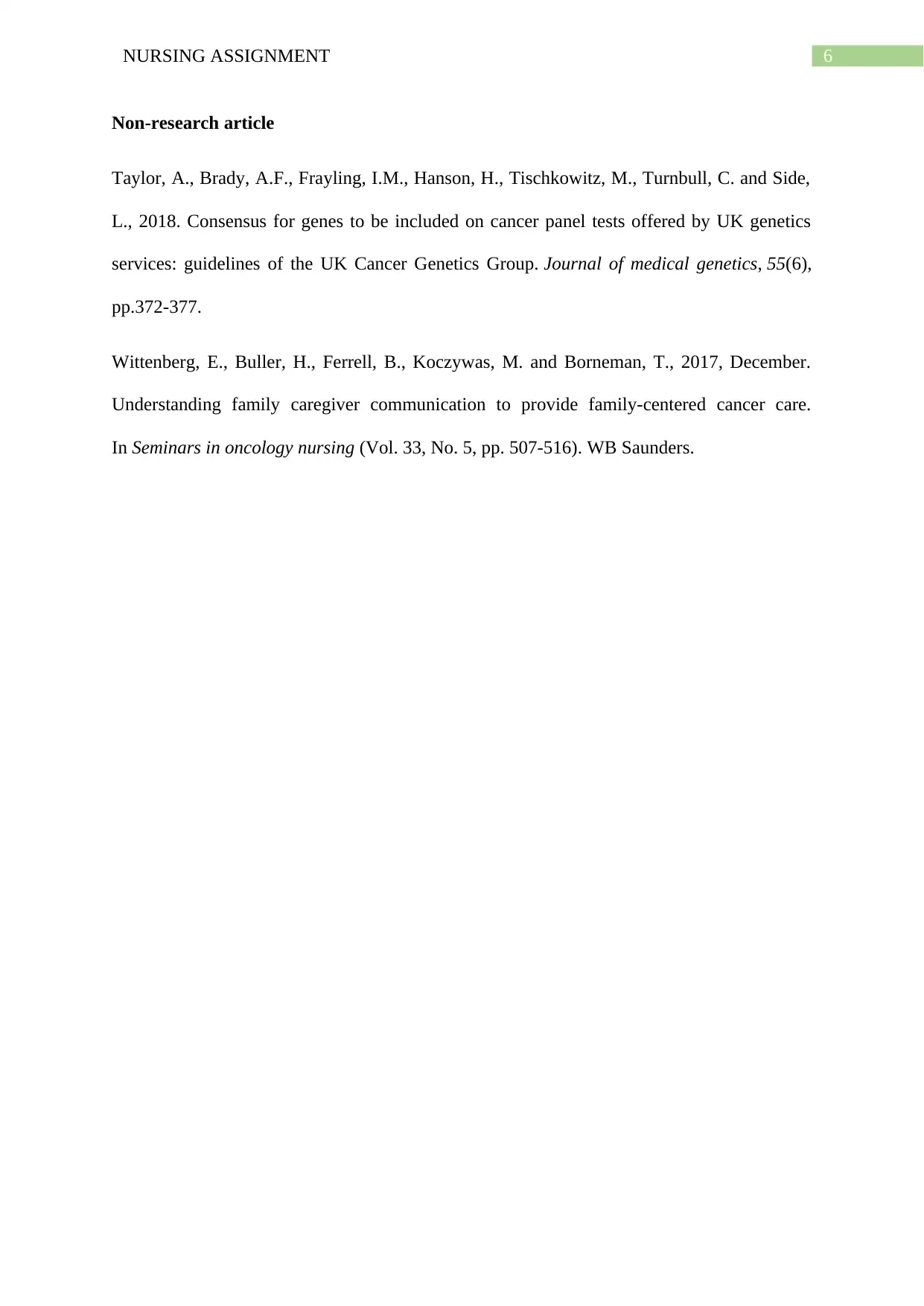
6NURSING ASSIGNMENT
Non-research article
Taylor, A., Brady, A.F., Frayling, I.M., Hanson, H., Tischkowitz, M., Turnbull, C. and Side,
L., 2018. Consensus for genes to be included on cancer panel tests offered by UK genetics
services: guidelines of the UK Cancer Genetics Group. Journal of medical genetics, 55(6),
pp.372-377.
Wittenberg, E., Buller, H., Ferrell, B., Koczywas, M. and Borneman, T., 2017, December.
Understanding family caregiver communication to provide family-centered cancer care.
In Seminars in oncology nursing (Vol. 33, No. 5, pp. 507-516). WB Saunders.
Non-research article
Taylor, A., Brady, A.F., Frayling, I.M., Hanson, H., Tischkowitz, M., Turnbull, C. and Side,
L., 2018. Consensus for genes to be included on cancer panel tests offered by UK genetics
services: guidelines of the UK Cancer Genetics Group. Journal of medical genetics, 55(6),
pp.372-377.
Wittenberg, E., Buller, H., Ferrell, B., Koczywas, M. and Borneman, T., 2017, December.
Understanding family caregiver communication to provide family-centered cancer care.
In Seminars in oncology nursing (Vol. 33, No. 5, pp. 507-516). WB Saunders.
Paraphrase This Document
Need a fresh take? Get an instant paraphrase of this document with our AI Paraphraser

7NURSING ASSIGNMENT
Books
Bandura, A., 2017. Psychotherapeutic treatment of cancer patients. Routledge, New York.
Books
Bandura, A., 2017. Psychotherapeutic treatment of cancer patients. Routledge, New York.
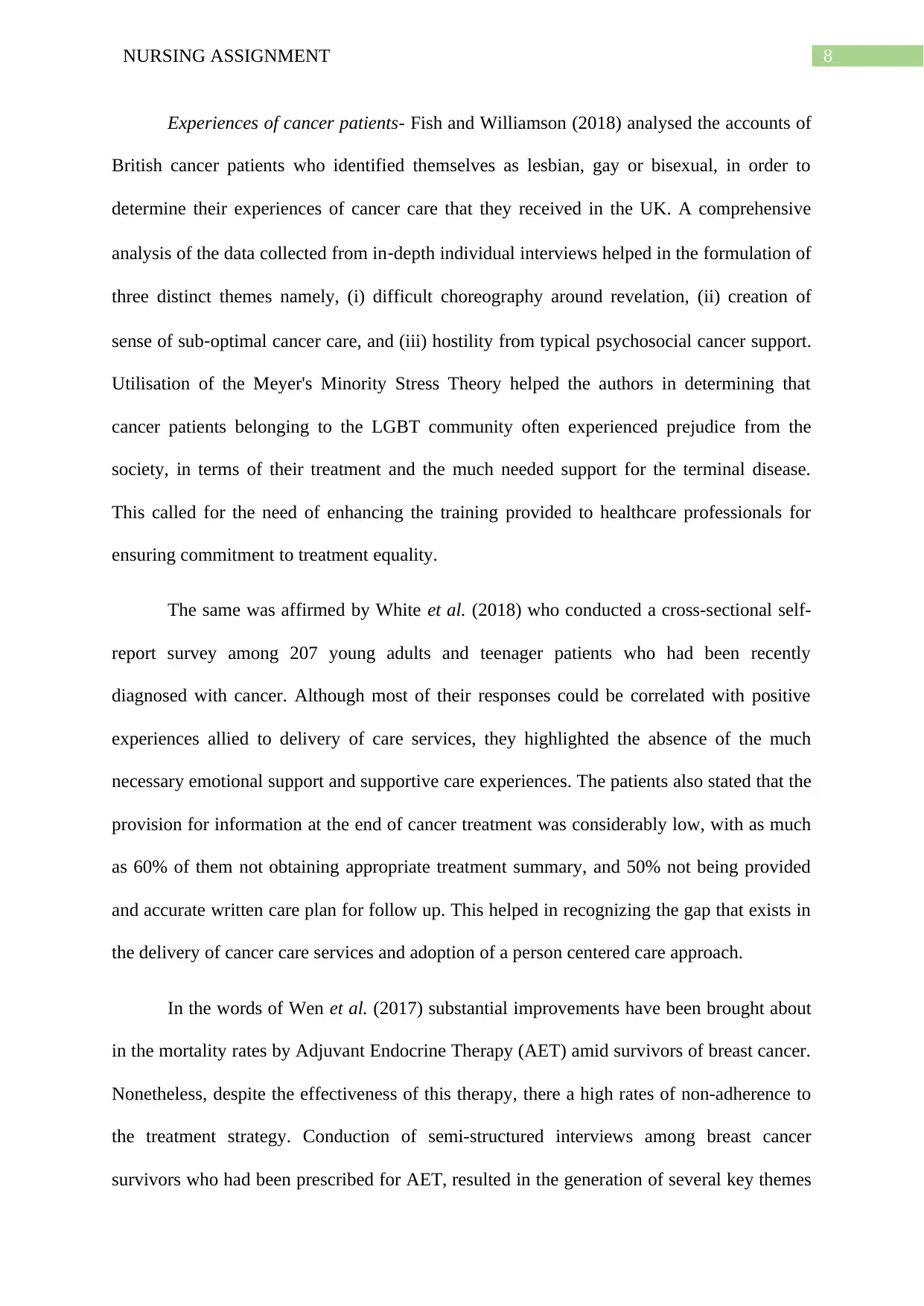
8NURSING ASSIGNMENT
Experiences of cancer patients- Fish and Williamson (2018) analysed the accounts of
British cancer patients who identified themselves as lesbian, gay or bisexual, in order to
determine their experiences of cancer care that they received in the UK. A comprehensive
analysis of the data collected from in‐depth individual interviews helped in the formulation of
three distinct themes namely, (i) difficult choreography around revelation, (ii) creation of
sense of sub‐optimal cancer care, and (iii) hostility from typical psychosocial cancer support.
Utilisation of the Meyer's Minority Stress Theory helped the authors in determining that
cancer patients belonging to the LGBT community often experienced prejudice from the
society, in terms of their treatment and the much needed support for the terminal disease.
This called for the need of enhancing the training provided to healthcare professionals for
ensuring commitment to treatment equality.
The same was affirmed by White et al. (2018) who conducted a cross-sectional self-
report survey among 207 young adults and teenager patients who had been recently
diagnosed with cancer. Although most of their responses could be correlated with positive
experiences allied to delivery of care services, they highlighted the absence of the much
necessary emotional support and supportive care experiences. The patients also stated that the
provision for information at the end of cancer treatment was considerably low, with as much
as 60% of them not obtaining appropriate treatment summary, and 50% not being provided
and accurate written care plan for follow up. This helped in recognizing the gap that exists in
the delivery of cancer care services and adoption of a person centered care approach.
In the words of Wen et al. (2017) substantial improvements have been brought about
in the mortality rates by Adjuvant Endocrine Therapy (AET) amid survivors of breast cancer.
Nonetheless, despite the effectiveness of this therapy, there a high rates of non-adherence to
the treatment strategy. Conduction of semi-structured interviews among breast cancer
survivors who had been prescribed for AET, resulted in the generation of several key themes
Experiences of cancer patients- Fish and Williamson (2018) analysed the accounts of
British cancer patients who identified themselves as lesbian, gay or bisexual, in order to
determine their experiences of cancer care that they received in the UK. A comprehensive
analysis of the data collected from in‐depth individual interviews helped in the formulation of
three distinct themes namely, (i) difficult choreography around revelation, (ii) creation of
sense of sub‐optimal cancer care, and (iii) hostility from typical psychosocial cancer support.
Utilisation of the Meyer's Minority Stress Theory helped the authors in determining that
cancer patients belonging to the LGBT community often experienced prejudice from the
society, in terms of their treatment and the much needed support for the terminal disease.
This called for the need of enhancing the training provided to healthcare professionals for
ensuring commitment to treatment equality.
The same was affirmed by White et al. (2018) who conducted a cross-sectional self-
report survey among 207 young adults and teenager patients who had been recently
diagnosed with cancer. Although most of their responses could be correlated with positive
experiences allied to delivery of care services, they highlighted the absence of the much
necessary emotional support and supportive care experiences. The patients also stated that the
provision for information at the end of cancer treatment was considerably low, with as much
as 60% of them not obtaining appropriate treatment summary, and 50% not being provided
and accurate written care plan for follow up. This helped in recognizing the gap that exists in
the delivery of cancer care services and adoption of a person centered care approach.
In the words of Wen et al. (2017) substantial improvements have been brought about
in the mortality rates by Adjuvant Endocrine Therapy (AET) amid survivors of breast cancer.
Nonetheless, despite the effectiveness of this therapy, there a high rates of non-adherence to
the treatment strategy. Conduction of semi-structured interviews among breast cancer
survivors who had been prescribed for AET, resulted in the generation of several key themes
⊘ This is a preview!⊘
Do you want full access?
Subscribe today to unlock all pages.

Trusted by 1+ million students worldwide
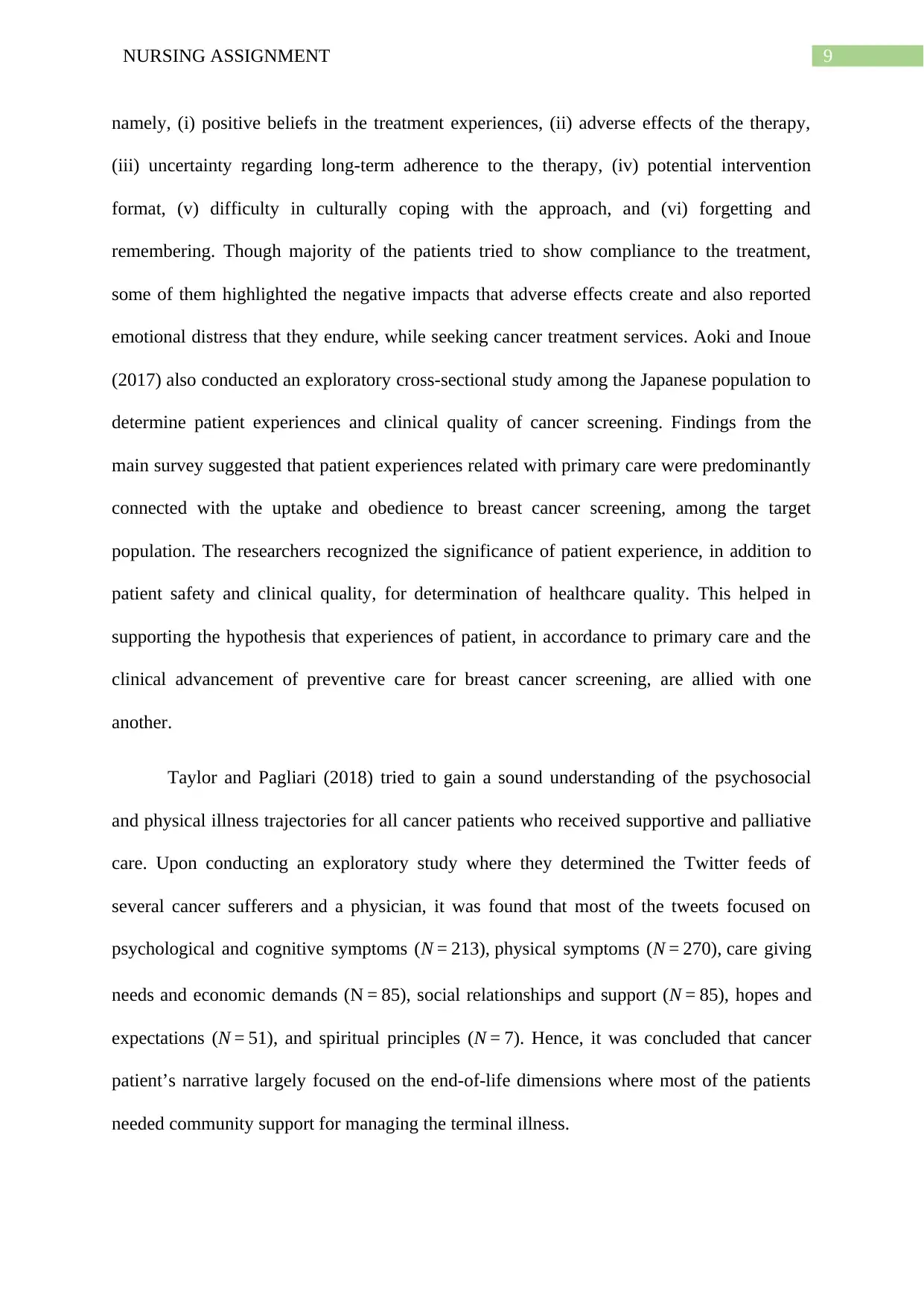
9NURSING ASSIGNMENT
namely, (i) positive beliefs in the treatment experiences, (ii) adverse effects of the therapy,
(iii) uncertainty regarding long-term adherence to the therapy, (iv) potential intervention
format, (v) difficulty in culturally coping with the approach, and (vi) forgetting and
remembering. Though majority of the patients tried to show compliance to the treatment,
some of them highlighted the negative impacts that adverse effects create and also reported
emotional distress that they endure, while seeking cancer treatment services. Aoki and Inoue
(2017) also conducted an exploratory cross-sectional study among the Japanese population to
determine patient experiences and clinical quality of cancer screening. Findings from the
main survey suggested that patient experiences related with primary care were predominantly
connected with the uptake and obedience to breast cancer screening, among the target
population. The researchers recognized the significance of patient experience, in addition to
patient safety and clinical quality, for determination of healthcare quality. This helped in
supporting the hypothesis that experiences of patient, in accordance to primary care and the
clinical advancement of preventive care for breast cancer screening, are allied with one
another.
Taylor and Pagliari (2018) tried to gain a sound understanding of the psychosocial
and physical illness trajectories for all cancer patients who received supportive and palliative
care. Upon conducting an exploratory study where they determined the Twitter feeds of
several cancer sufferers and a physician, it was found that most of the tweets focused on
psychological and cognitive symptoms (N = 213), physical symptoms (N = 270), care giving
needs and economic demands (N = 85), social relationships and support (N = 85), hopes and
expectations (N = 51), and spiritual principles (N = 7). Hence, it was concluded that cancer
patient’s narrative largely focused on the end-of-life dimensions where most of the patients
needed community support for managing the terminal illness.
namely, (i) positive beliefs in the treatment experiences, (ii) adverse effects of the therapy,
(iii) uncertainty regarding long-term adherence to the therapy, (iv) potential intervention
format, (v) difficulty in culturally coping with the approach, and (vi) forgetting and
remembering. Though majority of the patients tried to show compliance to the treatment,
some of them highlighted the negative impacts that adverse effects create and also reported
emotional distress that they endure, while seeking cancer treatment services. Aoki and Inoue
(2017) also conducted an exploratory cross-sectional study among the Japanese population to
determine patient experiences and clinical quality of cancer screening. Findings from the
main survey suggested that patient experiences related with primary care were predominantly
connected with the uptake and obedience to breast cancer screening, among the target
population. The researchers recognized the significance of patient experience, in addition to
patient safety and clinical quality, for determination of healthcare quality. This helped in
supporting the hypothesis that experiences of patient, in accordance to primary care and the
clinical advancement of preventive care for breast cancer screening, are allied with one
another.
Taylor and Pagliari (2018) tried to gain a sound understanding of the psychosocial
and physical illness trajectories for all cancer patients who received supportive and palliative
care. Upon conducting an exploratory study where they determined the Twitter feeds of
several cancer sufferers and a physician, it was found that most of the tweets focused on
psychological and cognitive symptoms (N = 213), physical symptoms (N = 270), care giving
needs and economic demands (N = 85), social relationships and support (N = 85), hopes and
expectations (N = 51), and spiritual principles (N = 7). Hence, it was concluded that cancer
patient’s narrative largely focused on the end-of-life dimensions where most of the patients
needed community support for managing the terminal illness.
Paraphrase This Document
Need a fresh take? Get an instant paraphrase of this document with our AI Paraphraser
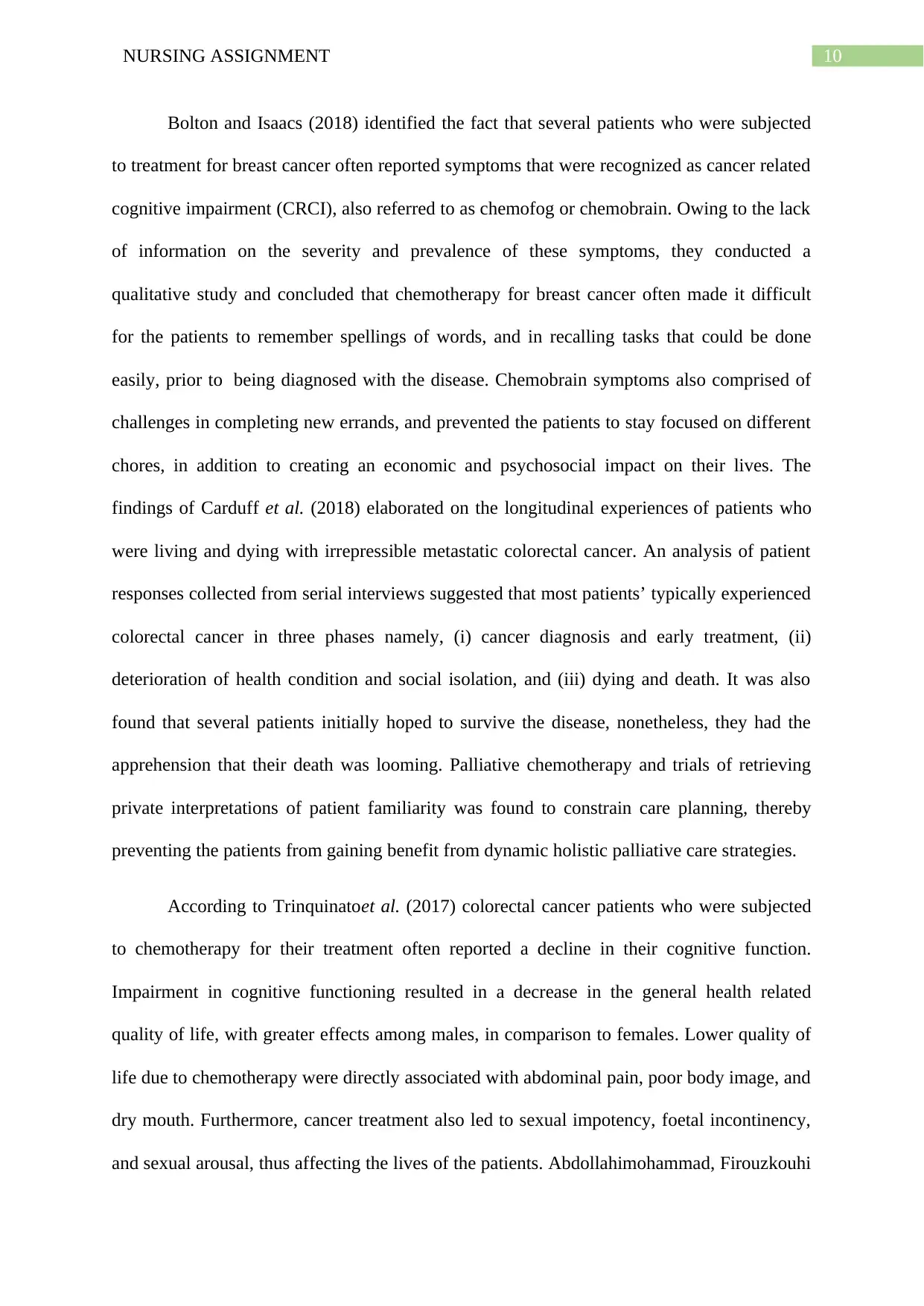
10NURSING ASSIGNMENT
Bolton and Isaacs (2018) identified the fact that several patients who were subjected
to treatment for breast cancer often reported symptoms that were recognized as cancer related
cognitive impairment (CRCI), also referred to as chemofog or chemobrain. Owing to the lack
of information on the severity and prevalence of these symptoms, they conducted a
qualitative study and concluded that chemotherapy for breast cancer often made it difficult
for the patients to remember spellings of words, and in recalling tasks that could be done
easily, prior to being diagnosed with the disease. Chemobrain symptoms also comprised of
challenges in completing new errands, and prevented the patients to stay focused on different
chores, in addition to creating an economic and psychosocial impact on their lives. The
findings of Carduff et al. (2018) elaborated on the longitudinal experiences of patients who
were living and dying with irrepressible metastatic colorectal cancer. An analysis of patient
responses collected from serial interviews suggested that most patients’ typically experienced
colorectal cancer in three phases namely, (i) cancer diagnosis and early treatment, (ii)
deterioration of health condition and social isolation, and (iii) dying and death. It was also
found that several patients initially hoped to survive the disease, nonetheless, they had the
apprehension that their death was looming. Palliative chemotherapy and trials of retrieving
private interpretations of patient familiarity was found to constrain care planning, thereby
preventing the patients from gaining benefit from dynamic holistic palliative care strategies.
According to Trinquinatoet al. (2017) colorectal cancer patients who were subjected
to chemotherapy for their treatment often reported a decline in their cognitive function.
Impairment in cognitive functioning resulted in a decrease in the general health related
quality of life, with greater effects among males, in comparison to females. Lower quality of
life due to chemotherapy were directly associated with abdominal pain, poor body image, and
dry mouth. Furthermore, cancer treatment also led to sexual impotency, foetal incontinency,
and sexual arousal, thus affecting the lives of the patients. Abdollahimohammad, Firouzkouhi
Bolton and Isaacs (2018) identified the fact that several patients who were subjected
to treatment for breast cancer often reported symptoms that were recognized as cancer related
cognitive impairment (CRCI), also referred to as chemofog or chemobrain. Owing to the lack
of information on the severity and prevalence of these symptoms, they conducted a
qualitative study and concluded that chemotherapy for breast cancer often made it difficult
for the patients to remember spellings of words, and in recalling tasks that could be done
easily, prior to being diagnosed with the disease. Chemobrain symptoms also comprised of
challenges in completing new errands, and prevented the patients to stay focused on different
chores, in addition to creating an economic and psychosocial impact on their lives. The
findings of Carduff et al. (2018) elaborated on the longitudinal experiences of patients who
were living and dying with irrepressible metastatic colorectal cancer. An analysis of patient
responses collected from serial interviews suggested that most patients’ typically experienced
colorectal cancer in three phases namely, (i) cancer diagnosis and early treatment, (ii)
deterioration of health condition and social isolation, and (iii) dying and death. It was also
found that several patients initially hoped to survive the disease, nonetheless, they had the
apprehension that their death was looming. Palliative chemotherapy and trials of retrieving
private interpretations of patient familiarity was found to constrain care planning, thereby
preventing the patients from gaining benefit from dynamic holistic palliative care strategies.
According to Trinquinatoet al. (2017) colorectal cancer patients who were subjected
to chemotherapy for their treatment often reported a decline in their cognitive function.
Impairment in cognitive functioning resulted in a decrease in the general health related
quality of life, with greater effects among males, in comparison to females. Lower quality of
life due to chemotherapy were directly associated with abdominal pain, poor body image, and
dry mouth. Furthermore, cancer treatment also led to sexual impotency, foetal incontinency,
and sexual arousal, thus affecting the lives of the patients. Abdollahimohammad, Firouzkouhi
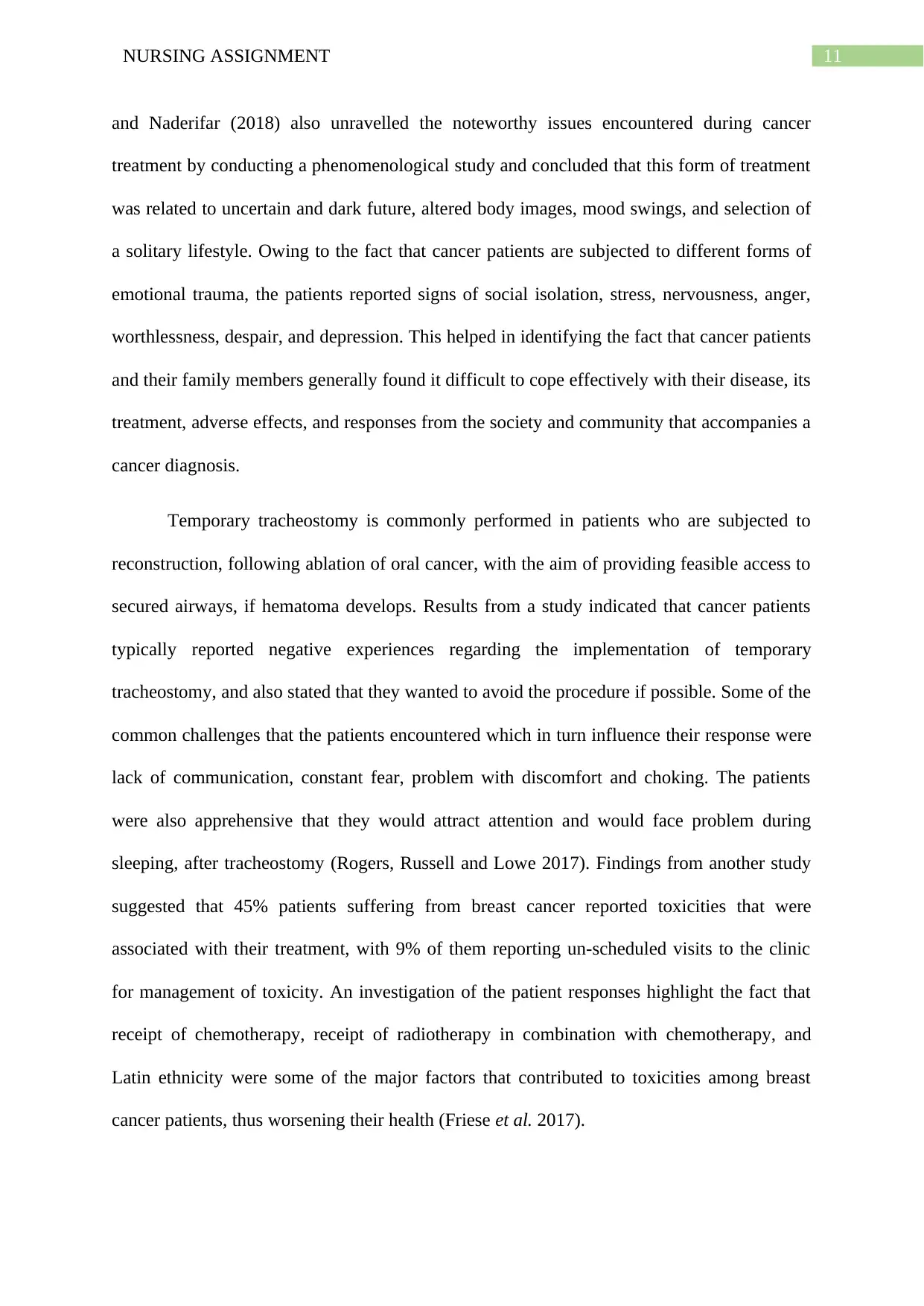
11NURSING ASSIGNMENT
and Naderifar (2018) also unravelled the noteworthy issues encountered during cancer
treatment by conducting a phenomenological study and concluded that this form of treatment
was related to uncertain and dark future, altered body images, mood swings, and selection of
a solitary lifestyle. Owing to the fact that cancer patients are subjected to different forms of
emotional trauma, the patients reported signs of social isolation, stress, nervousness, anger,
worthlessness, despair, and depression. This helped in identifying the fact that cancer patients
and their family members generally found it difficult to cope effectively with their disease, its
treatment, adverse effects, and responses from the society and community that accompanies a
cancer diagnosis.
Temporary tracheostomy is commonly performed in patients who are subjected to
reconstruction, following ablation of oral cancer, with the aim of providing feasible access to
secured airways, if hematoma develops. Results from a study indicated that cancer patients
typically reported negative experiences regarding the implementation of temporary
tracheostomy, and also stated that they wanted to avoid the procedure if possible. Some of the
common challenges that the patients encountered which in turn influence their response were
lack of communication, constant fear, problem with discomfort and choking. The patients
were also apprehensive that they would attract attention and would face problem during
sleeping, after tracheostomy (Rogers, Russell and Lowe 2017). Findings from another study
suggested that 45% patients suffering from breast cancer reported toxicities that were
associated with their treatment, with 9% of them reporting un-scheduled visits to the clinic
for management of toxicity. An investigation of the patient responses highlight the fact that
receipt of chemotherapy, receipt of radiotherapy in combination with chemotherapy, and
Latin ethnicity were some of the major factors that contributed to toxicities among breast
cancer patients, thus worsening their health (Friese et al. 2017).
and Naderifar (2018) also unravelled the noteworthy issues encountered during cancer
treatment by conducting a phenomenological study and concluded that this form of treatment
was related to uncertain and dark future, altered body images, mood swings, and selection of
a solitary lifestyle. Owing to the fact that cancer patients are subjected to different forms of
emotional trauma, the patients reported signs of social isolation, stress, nervousness, anger,
worthlessness, despair, and depression. This helped in identifying the fact that cancer patients
and their family members generally found it difficult to cope effectively with their disease, its
treatment, adverse effects, and responses from the society and community that accompanies a
cancer diagnosis.
Temporary tracheostomy is commonly performed in patients who are subjected to
reconstruction, following ablation of oral cancer, with the aim of providing feasible access to
secured airways, if hematoma develops. Results from a study indicated that cancer patients
typically reported negative experiences regarding the implementation of temporary
tracheostomy, and also stated that they wanted to avoid the procedure if possible. Some of the
common challenges that the patients encountered which in turn influence their response were
lack of communication, constant fear, problem with discomfort and choking. The patients
were also apprehensive that they would attract attention and would face problem during
sleeping, after tracheostomy (Rogers, Russell and Lowe 2017). Findings from another study
suggested that 45% patients suffering from breast cancer reported toxicities that were
associated with their treatment, with 9% of them reporting un-scheduled visits to the clinic
for management of toxicity. An investigation of the patient responses highlight the fact that
receipt of chemotherapy, receipt of radiotherapy in combination with chemotherapy, and
Latin ethnicity were some of the major factors that contributed to toxicities among breast
cancer patients, thus worsening their health (Friese et al. 2017).
⊘ This is a preview!⊘
Do you want full access?
Subscribe today to unlock all pages.

Trusted by 1+ million students worldwide
1 out of 14
Related Documents
Your All-in-One AI-Powered Toolkit for Academic Success.
+13062052269
info@desklib.com
Available 24*7 on WhatsApp / Email
![[object Object]](/_next/static/media/star-bottom.7253800d.svg)
Unlock your academic potential
Copyright © 2020–2026 A2Z Services. All Rights Reserved. Developed and managed by ZUCOL.





